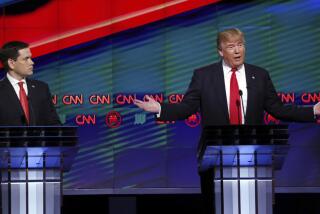Don’t Fence Him In With Old Ideologies
Right, left; conservative, liberal; we, they: I am tired of the great issues of our nation being mindlessly structured in the outdated two-dimensional rhetoric of yesterday. “Clinton panders to the right” intones the lead of an article on the president’s State of the Union speech declaring the “end of big government.” “Republican Congress caves to liberals as 104th Congress grinds to an end” starts another.
Five years ago, after a lifetime of supporting Republicans, I first spoke with and then met Gov. Bill Clinton. I know Bill Clinton, and he is certainly no “conservative.” I know Bill Clinton, and neither is he a “liberal.” The man I have known as candidate and then president is an extraordinary politician, no doubt, but one who has consistently dealt with the issues facing our country on their merits, not with ideologies, not with old paradigms of left and right. And yet, in the face of all the progress we have made, we still see those who are supposed to bring us objectivity, enlightened debate--the nation’s press--still defining everything he does in the outdated paradigm of right or left.
I expect that characterization from his opponents because they really believe that our country’s complex problems should be dealt with using yesterday’s approaches. This position combined with the long list of the administration’s accomplishments gives them little choice but to try to paint the president as a “closet liberal” who steals “Republican” programs.
I do not argue that this president has come up with the best solution every time. But I do argue that his decisions have been based on his evaluation of the facts, not first screened through the useless sieve of old ideologies.
I was there when he took on liberals in his Cabinet and Congress and told them he was going to propose a balanced budget. I was there when he told the labor unions that they were wrong to oppose NAFTA, that in the long term it would be good for their members. I was there for--and strongly opposed--his veto of the securities legal reform bill. I also was there right after the GOP congressional sweep in 1994 when he told a group of major Democratic Party contributors that he appreciated their substantial and “early” money, but that running for president while being president was very different from running for president from the “outside”; that he would probably do things in the next two years that they may not like “because I am the president of all the people, not just Democrats.” (There was no press present, no pundits to “spin” his remarks.)
The term “new Democrat” has, in my view, a much more substantive meaning than putting new shoes on an old horse. The principles and programs outlined by Al From, by Sens. Sam Nunn and Joe Lieberman, and many others, and by then-Gov. and now-President Clinton, and even by Jack Kemp (until his midnight conversion to the old order) speak to the new approaches we must find for the old problems of public education’s deterioration, health care costs and access, drug and crime cultures and the old-fashioned idea of each of us having responsibilities to one another.
As incomplete as the solutions have been, these are the issues that President Clinton has been trying to address during the last four years and will continue to in the next four years. To trivialize those attempts and significant successes by saying that reducing the deficit by more than 50%, committing to balance the budget, cutting the size of government by more than 200,000 people, fighting crime in the streets and standing firm for middle-class values was done just to pander to the right and that upon reelection, he will turn to his true “liberal” self, is not only wrong, but dangerously delays the day when our politics are once again defined by real results, not rhetoric.
I do not ask that everyone agree with the president’s actions or his policies. I am asking that he, and others aspiring to lead politically, be judged by the quality of their ideas as they relate to the realities of today’s problems, not by their loyalties to yesterday’s ideologies.
I am more proud today that I supported Bill Clinton than I was nearly five years ago, not because I agree with all that he has done, but because he has returned the governing process to dealing with the major issues facing our country and is dealing with them on their merits.
More to Read
Get the L.A. Times Politics newsletter
Deeply reported insights into legislation, politics and policy from Sacramento, Washington and beyond. In your inbox three times per week.
You may occasionally receive promotional content from the Los Angeles Times.










